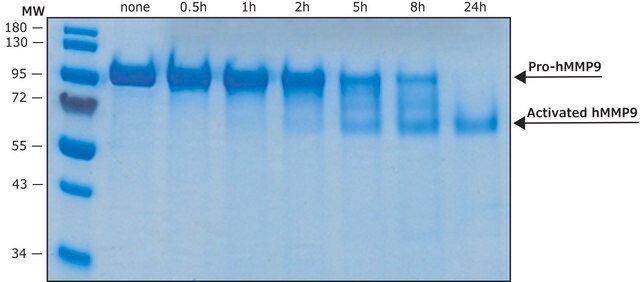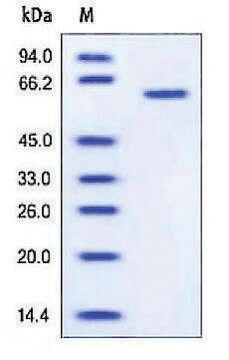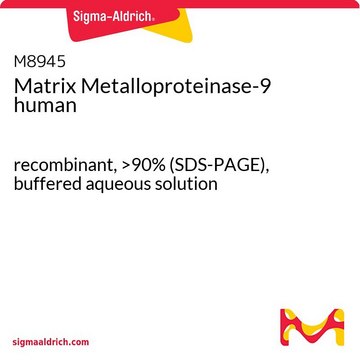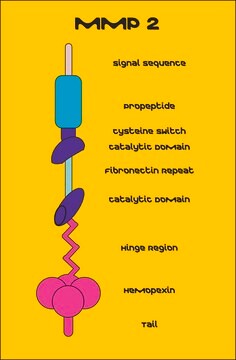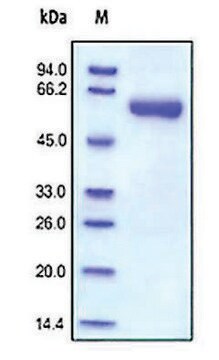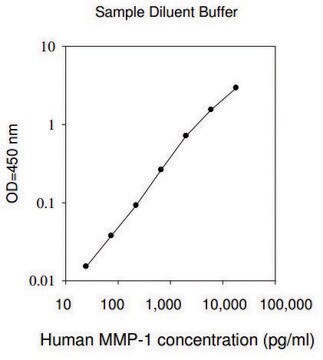SRP3117
MMP-1 human
recombinant, expressed in E. coli, ≥98% (SDS-PAGE), ≥98% (HPLC), suitable for cell culture
Synonym(s):
Fibroblast collagenase
Sign Into View Organizational & Contract Pricing
All Photos(1)
About This Item
UNSPSC Code:
12352202
NACRES:
NA.32
Recommended Products
biological source
human
recombinant
expressed in E. coli
Assay
≥98% (HPLC)
≥98% (SDS-PAGE)
form
lyophilized
mol wt
42.7 kDa
packaging
pkg of 10 μg
technique(s)
cell culture | mammalian: suitable
impurities
<0.1 EU/μg endotoxin, tested
color
white to off-white
UniProt accession no.
shipped in
wet ice
storage temp.
−20°C
Gene Information
human ... MMP1(4312)
General description
Matrix metalloproteinases (MMPs) are a family of endoproteases that require zinc and calcium for expressing catalytic activity. MMP-1 is expressed in various cells, including fibroblasts, keratinocytes, chondrocytes, monocytes and macrophages, hepatocytes and many tumor cells. The gene is mapped to human chromosome 11q22. Recombinant human MMP-1 is a 42.7kDa protein containing the entire catalytic N-terminal domain and the C-terminal domain which is involved in substrate specificity and in binding TIMP-1 (tissue inhibitor of metalloproteinases 1).
Application
MMP-1 (matrix metalloproteinase 1) human has been used to study effect of NF (nuclear factor)κB-mediated expression of MMP-1 in breast cancer spheroids.
Biochem/physiol Actions
Matrix metalloproteinases (MMPs) enzymes play a central role in the maintenance and remodeling of the extracellular matrix. Elevated expression of their activity, caused either by up-regulation of their expression or down-regulation of their cognate inhibitors, has been implicated in various degenerative disorders, including arthritis, cardiovascular disease, skeletal growth-plate disorders, and cancer metastasis. MMP-1 is a secreted collagenase with specificity toward Type I, II, III, VII, and X collagens, aggrecan, serpins, and α2-macroglobulin. It is overexpressed in lumbar intervertebral disc degeneration (IDD). It might also be associated with osteoarthritis. MMP-1 is linked with Jjuvenile idiopathic arthritis. Genetic variations in MMP-1 can affect the susceptibility and severity of this disease.
Sequence
MFVLTEGNPR WEQTHLTYRI ENYTPDLPRA DVDHAIEKAF QLWSNVTPLT FTKVSEGQAD IMISFVRGDH RDNSPFDGPG GNLAHAFQPG PGIGGDAHFD EDERWTNNFR EYNLHRVAAH ELGHSLGLSH STDIGALMYP SYTFSGDVQL AQDDIDGIQA IYGRSQNPVQ PIGPQTPKAC DSKLTFDAIT TIRGEVMFFK DRFYMRTNPF YPEVELNFIS VFWPQLPNGL EAAYEFADRD EVRFFKGNKY WAVQGQNVLH GYPKDIYSSF GFPRTVKHID AALSEENTGK TYFFVANKYW RYDEYKRSMD PGYPKMIAHD FPGIGHKVDA VFMKDGFFYF FHGTRQYKFD PKTKRILTLQ KANSWFNCRK N
Physical form
Lyophilized from 20 mM TRIS, pH 9.0 + 0.1 mM Calcium Chloride + 100 mM Arginine.
Reconstitution
Centrifuge the vial prior to opening. Reconstitute in water to a concentration of 0.5-1.0 mg/ml. Do not vortex. This solution can be stored at 2-8°C for up to 1 week. For extended storage, it is recommended to further dilute in a buffer containing a carrier protein (example 0.1% BSA) and store in working aliquots at -20°C to -80°C.
Storage Class Code
11 - Combustible Solids
WGK
WGK 3
Flash Point(F)
Not applicable
Flash Point(C)
Not applicable
Choose from one of the most recent versions:
Already Own This Product?
Find documentation for the products that you have recently purchased in the Document Library.
Customers Also Viewed
Chi Huu Nguyen et al.
Oncotarget, 6(36), 39262-39275 (2015-10-30)
RELA, RELB, CREL, NFKB1 and NFKB2, and the upstream regulators NEMO and NIK were knocked-down in lymph endothelial cells (LECs) and in MDA-MB231 breast cancer spheroids to study the contribution of NF-κB in vascular barrier breaching. Suppression of RELA, NFKB1
Haplotypes in matrix metalloproteinase gene cluster on chromosome 11q22 contribute to the risk of lung cancer development and progression.
Clinical Cancer Research, 12, 7009-7017 (2006)
Regulation of matrix metalloproteinase expression in tumor invasion.
Westermarck J and Kahari VM
Faseb Journal, 13, 781-792 (1999)
Influence of Matrix metalloproteinase 1 and 3 genetic variations on susceptibility and severity of juvenile idiopathic arthritis.
Abd-Allah SH
IUBMB Life, 67, 934-942 (2015)
Joanna Sikora et al.
Journal of biomedical optics, 20(5), 051039-051039 (2015-03-13)
The concentration of collagen degradation products (CDPs) may reflect the process of left ventricular remodeling (LVR). The aim of this study was to evaluate the potential diagnostic usefulness of time-resolved fluorescence spectroscopy (TRFS) in assessment of CDPs. The preliminary experiment
Our team of scientists has experience in all areas of research including Life Science, Material Science, Chemical Synthesis, Chromatography, Analytical and many others.
Contact Technical Service
